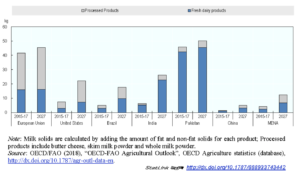Dr. Ezra Shoshani
Dairy consultant
The dramatic dynamic change in the whole world of meat and milk consumption will be evident towards the next 10 years. But, the magnitude of change will be differed between developed countries and developing countries. It is assumed that milk consumption will dramatically increase while the milk production will be lag behind. The increase in milk consumption is attributed to increase per capita consumption of the urban population, mainly in the developing countries (from 1 to 3.8 Billion while in the developed countries the increase will be minor). The expected deficiency of milk production is requiring all developing countries to build a strategy how to increase the milk production within their countries by assisting the dairy farmers to upgrade their farms, as well as their knowledge.
Making smallholder dairy production more competitive could be a powerful tool for reducing poverty, raising nutrition levels and improving the livelihoods of rural people in many developing countries. However, the survival of dairy farms today is sole dependent on the ability of the owners to increase the size of their herds, conjugate with improving their knowledge and skill of managing those increasing-size herds.
Global milk demand is growing by 2.5% year to year, mostly in developing countries located in Asia, Africa and South America.
Growing consumer demand for dairy products in developing countries, driven by population growth and rising incomes is evident in developing countries due to a sharp rise in urban population.
Dairy sector development can therefore be a potent tool for poverty reduction.
The revolutionize trend will be most evident in East Asia as illustrated by the per capita figures for India and Pakistan, but also in Middle East and North Africa (MENA). As aforementioned, the increase of dairy products is prominent in the big cities and this trend will continue further due to the mass immigration from the rural area to big cities. Conversely to those countries, per capita milk consumption is stagnated in developed countries due to saturation level of consumption and small increase of population (figure 1).

Figure 1. processed products and fresh dairy products, expressed as capita consumption, between 2017 and 2027
The increase in milk supply in developing countries, as mentioned above, will probably be achieved by an increase in total number of milking cows. Due to economic pressure the average size of the herds will increase while concomitant decrease in the number of the dairy farms. This trend will be occurred globally.
Concomitantly, global export market, mainly milk powder and butter, will continue to exist due to deficiency in milk production in many developing countries despite the assumption of increase in their milk production. However, the conversion of milk to powder and reconstitute it is not a cost effective process. Therefore it is reasonable to assume that milk should be produced locally within the countries by intensification (i.e. increase milk production of every cow and managing the herd on the basis of collecting data from different sources on a cow basis). Many developing countries are lacking the knowledge how to do it.
Israel has developed a comprehensive system that could be adopted by those countries. First we have the knowledge how to produce milk under heat stress conditions. Milk yield per cow annually is the per cow. Also farmers who adopted the technologies developed in Israel, have been using milking and management technologies which have been developed by two companies: Zacham Afikim and SCR and enable the users to receive on-line information about every cow during milking and along the day. Israel brought the feeding to a sophisticated level in which giving the cow the most appropriate food, served as total mixing ration with the lowest cost by using by-products from the food industry. The intensification also include the construction of “envelope” organizations, owned by the farmers themselves, which give services to the farmers on cost price only such as artificial insemination, veterinarian services, udder health, herd book, central feeding centers, etc. Due to the climate conditions comprehensive procedure were developed to effectively cooling the cows during hot season in both: waiting yards (adjacent to milking parlour) or cooling yards (adjacent to the barns in case of large herds) and within the barns (along the feeding lane).
Israel, through Agricultural and Rural Development Ministry and the Environmental Preservation Ministry, has published regulation which has been requiring all dairy farms’ owners to prevent the contamination of the environment. During 8 years the state of Israel subsidized all farms in order to fulfill those requirements and also to improve the welfare conditions by reconstructing the barns according to recommendations agreed by the extension service of Agricultural & Rural Development Ministry (SHAHAM) and later edited and published by the author. As a consequence to those regulations new designs were developed for the barns which facilitate the farmers to mobilize the roof of the milking cows’ barns as a resolution to the ban of using open yards (excluding farms in areas with less than 20 mm precipitation). Also the farmers are committed to treat the manure in original bio-gaz and compost plans or to construct systems which enabling storage of the manure and spread it onto the fields in non-rainy seasons only. In areas with high hydrological risk there is absolute ban of spreading the manure.
Today all farms completed the necessary investments and it might be announced that the dairy sector in Israel fully adopted and applied the above mentioned regulations.
As a whole our system is based on production with high economic effectiveness by using high-tech systems and working under full integration of all organizations mentioned above.